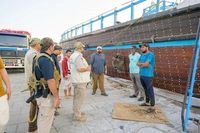Tareq Saleh, a member of the Presidential Leadership Council, recently inspected Al-Makha port in Taiz Governorate, focusing on plans to enhance its status as a pivotal transportation and export hub.
During his visit on March 21, 2025, Saleh reviewed comprehensive development strategies aimed at deepening the port and improving its infrastructure. The inspection is a crucial part of a broader initiative to transform Al-Makha into a vital center for shipping and exporting goods, particularly Yemeni agricultural products.
Saleh emphasized the significance of increasing exports through the port, particularly to the Arab Gulf countries and the Horn of Africa. Notably, he pointed out that these exports play an essential role in bolstering Yemen’s national economy.
At the port, Saleh interacted with numerous ship captains and workers involved in the operations. He assessed the processes for shipping thousands of tons of agricultural products, including local onions, to various international markets such as Saudi Arabia, the United Arab Emirates, and several African countries. This direct engagement highlighted his commitment to understanding the operations of the port and the challenges faced by those who work there.
“We need to enhance export capacity and improve the infrastructure of the port to support the national economy,” Saleh stated, reinforcing the urgency of upgrading the port facilities for better service delivery.
The need for improvement comes at a critical time for Yemen, as its economy faces numerous challenges. By developing Al-Makha port, the leadership aims to increase Yemen’s competitiveness in regional markets, enhancing its ability to export not just agricultural products but potentially other goods in the future.
In recent years, Al-Makha port has seen fluctuations in its operational capacity, largely impacted by the ongoing conflict in the region. Nevertheless, there is a strong push from the current administration, led by figures like Saleh, to revitalize this key infrastructure. The hope is that a successful overhaul can create jobs, improve economic conditions, and restore confidence in Yemen's logistical and transportation capabilities.
The discussions around the port's development are also seen as part of a larger strategy to support Yemen’s agricultural sector, which is critical for many rural communities across the country. Increasing the volume and efficiency of exports could vastly benefit local farmers and producers keen on reaching wider markets.
Moreover, cooperation between various stakeholders at Al-Makha port is indispensable for realizing these goals. Captain Ahmed, a veteran merchant at the port, shared his insights on the daily challenges faced, including outdated equipment and inefficiencies in the loading processes. He expressed optimism regarding the proposed upgrades but stressed that effective implementation would require a sustained commitment from the government and involvement from the private sector.
As Saleh wrapped up his visit, he reiterated the importance of intensifying efforts to develop the port further. He underscored that improving transportation and export services can significantly uplift Yemen's standing in the regional market.
The integration of advanced logistical solutions and improvements in port services could ultimately position Al-Makha port as a strategic asset not just for Yemen but for the entirety of the Middle East and Africa. The potential ramifications of a strengthened port system could facilitate trade, enhance local production, and support recovery from years of instability.
In conclusion, Tareq Saleh’s recent inspection of Al-Makha port marks a significant step towards revitalizing Yemen’s economic landscape. With focused efforts on infrastructure development and improved export capabilities, there exists a promising opportunity to reinvigorate a vital economic sector and bolster national pride in Yemen’s agricultural potential.


